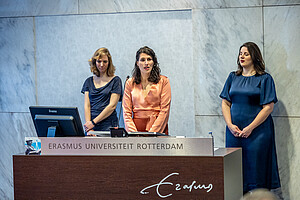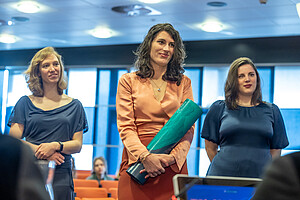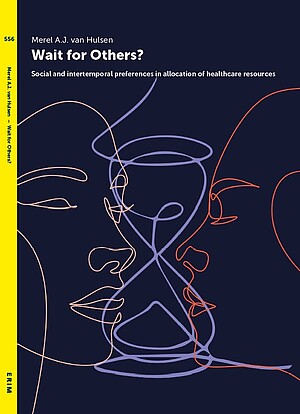PhD Defence Merel van Hulsen

In her dissertation, Wait for Others? Social and Intertemporal Preferences in Allocation of Healthcare Resources, ERIM’s Merel van Hulsen studied the joint effect of peoples’ social and intertemporal preferences on allocation decisions. The focus in these studies was on decision making in the healthcare domain; in most countries the budget for healthcare is limited and, therefore, decisions have to be made about how to spend this budget. Decisions about who receives treatment and when may of course have significant temporal and social consequences.
Merel defended her dissertation in the Senate Hall at Erasmus University Rotterdam (EUR) on Friday, 21 April 2023. Her supervisors were Prof. dr. Kirsten Rohde (ESE) and Prof. dr. Job van Exel (EUR). Other members of the Doctoral Committee were Prof. dr. Hans van Kippersluis (ESE), Prof. dr. Werner. Brouwer (EUR), Prof. dr. Eline van der Heijden (Tilburg University), Dr. Arthur Attema (EUR), Prof. dr. Jeroen van de Ven (University of Amsterdam), and Dr. Chen Li (ESE).
About Merel van Hulsen

Merel van Hulsen was born on the 29th of September 1994 in Den Haag. Before starting her PhD, she obtained a Bachelor of Science in International Economics and Business Economics at Erasmus University Rotterdam in 2016, during her Bachelor she also followed several courses of the Double Degree program in Philosophy. In 2017, she completed the Master of Science in Economics and Business Economics, specializing in Behavioral Economics, at the Erasmus School of Economics. In November of that year, Merel started as a PhD candidate under the supervision of Professor Kirsten Rohde and Professor Job van Exel. She carried out her research within the Department of Applied Economics at the Erasmus School of Economics as a member of the Erasmus Research Institute of Management (ERIM).
Merel’s research focuses on studying the relation between social and intertemporal preferences and their effect on decision making, using data obtained from conducting lab experiments as well as online surveys. Her work has been published in Oxford Open Economics, Social Science and Medicine and PLOS ONE. Merel will continue her career as policy maker at the Ministry of Education, Culture and Science in The Hague, The Netherlands.
Thesis Abstract

Every day, people make decisions that involve allocating scarce resources like time or money to one use or another. Such decisions may come with different consequences for others (social preferences) and for the future (intertemporal preferences). So far, research regarding the effect of peoples’ social and intertemporal preferences on their decision making have remained largely separate. In this thesis, the joint effect of these preferences on allocation decisions is studied. The focus in these studies is on decision making in the healthcare domain. This is an interesting and relevant domain for studying social and intertemporal preferences because in most countries the budget for healthcare is limited and, therefore, decisions have to be made about how to spend this budget. Decisions about who receives treatment and when may of course have significant temporal and social consequences.
All in all, using a variety of methods for collecting and analyzing data across the four chapters, this thesis shows that social preferences seem to have a stronger effect on decision making in the health care context than intertemporal preferences. Moreover, while there is considerable difference in preferences between people participating in the studies, a part of them is purely selfish in their choice behavior while another part seems more motivated by inequity aversion. This heterogeneity poses a challenge for policy makers. Targeted policies and communication strategies will be required to achieve behavioral change or public support for policies in the majority of the population.
View photos of Merel's PhD Defence
Photos: Chris Gorzeman / Capital Images


